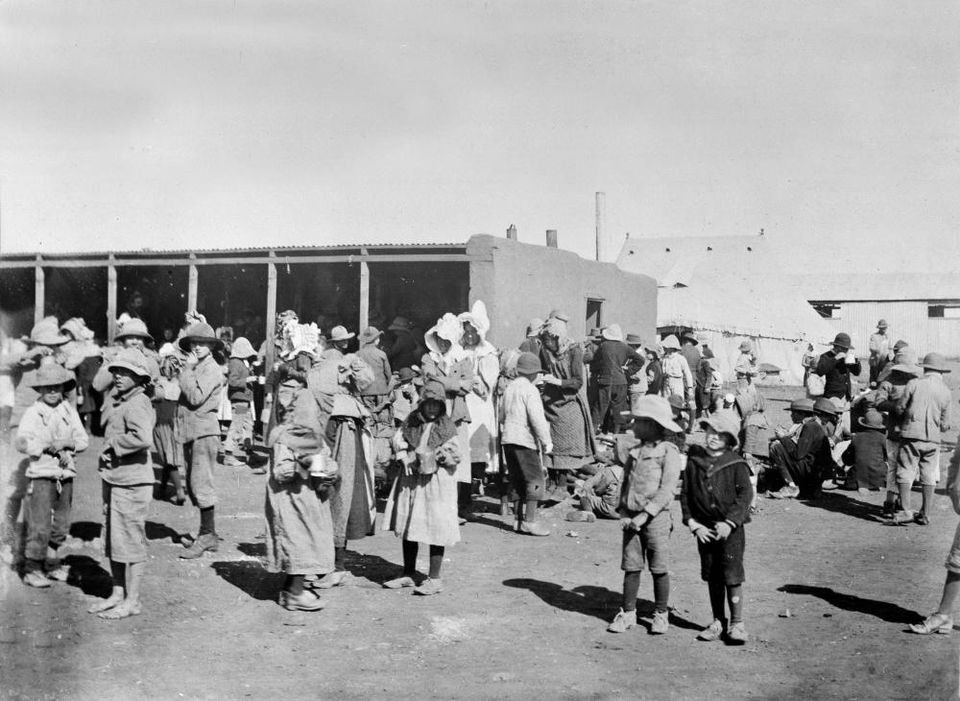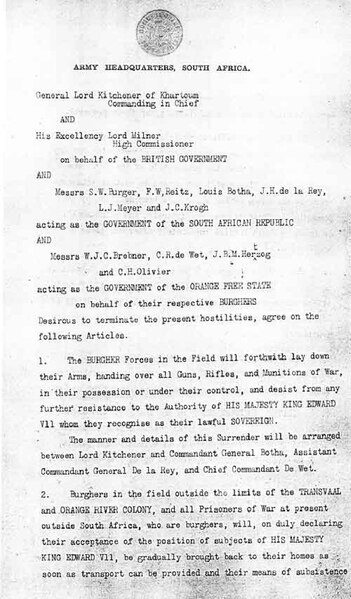IB Syllabus focus:
'Analyze the causes of the South African War, including economic, political, and strategic factors.
Study the course of the war, its consequences, and the Treaty of Vereeniging, which led to the Act of Union (1909).'
The South African War, also known as the Second Anglo-Boer War, was not only a significant conflict in South Africa's history but also had profound implications for the British Empire and the international community.
Causes of the South African War
Economic Factors
Discovery of Precious Minerals: The discovery of diamonds in Kimberley in 1867 and gold in Witwatersrand in 1886 transformed the regional economy. These discoveries made the Transvaal Republic extremely wealthy and attracted a massive influx of foreign immigrants (Uitlanders).
Uitlanders and Economic Grievances: These immigrants were critical to the economic growth but were denied political rights by the Boer government, leading to tensions. The Uitlanders’ grievances provided the British with a pretext to intervene.
British Imperial Ambitions: Cecil Rhodes, the British imperialist and Prime Minister of the Cape Colony, sought to consolidate British control over South African territories to secure economic interests and facilitate the Cape to Cairo railway project.
Political Factors
Boer Independence vs. British Expansion: The two Boer republics, the South African Republic (Transvaal) and the Orange Free State, were determined to maintain their independence in the face of British expansionism.
Afrikaner Nationalism: The fear of losing autonomy and cultural identity fuelled Afrikaner nationalism, which opposed British imperialism and pushed for the preservation of republican governance.
Jameson Raid: The failed Jameson Raid in 1895, an attempted uprising by Uitlanders with support from Rhodes and British authorities, heightened tensions and suspicion between the British and the Boer governments.
Strategic Factors
Regional Dominance: The British government aimed to assert control over the southern African region, both to tap into its wealth and to prevent other European powers, like Germany, from gaining influence.
Military Preparations: In the lead-up to the war, both the British and the Boer governments increased military preparations, seeing conflict as inevitable.
Course of the War
Initial Stages
Boer Strategy: The Boers initially adopted a successful offensive strategy, laying siege to key British towns such as Ladysmith, Mafeking, and Kimberley.
British Underestimation: The British underestimation of the Boer fighting capabilities led to early setbacks.
British Response
Reinforcements and New Leadership: In 1900, the British, under new military leadership from Lord Roberts and later Lord Kitchener, began to turn the tide. The sieges were lifted, and British forces captured the capitals of the Boer republics.
Transition to Guerrilla Warfare
Boer Adaptation: Facing overwhelming British forces, the Boers adopted guerrilla warfare tactics, leading to a protracted and bloody phase of the war.
Scorched Earth Policy: The British, under Kitchener, implemented a scorched earth policy, destroying Boer farms and placing women and children in concentration camps to cut off support to the Boer guerrillas.

Boer women and children in a British concentration camp during the war, c.1901. The image underscores the humanitarian consequences of the British scorched-earth strategy and the internment system that accompanied it. This photograph comes from official collections and is widely used by historians as visual evidence of wartime civilian suffering. Source
Conclusion of the War
Boer Surrender: Exhausted and unable to sustain their campaign, the Boers eventually surrendered, leading to peace negotiations.

The Peace Treaty of Vereeniging (31 May 1902) ended the South African War and confirmed British sovereignty over the Transvaal and Orange Free State. Its clauses set terms for disarmament, compensation for reconstruction, and a path toward limited self-government that ultimately led to Union in 1910. The scan is from the surviving official document. Source
Consequences of the War
Human and Economic Costs
High Casualties: The war resulted in significant loss of life among combatants and civilians.
Destruction and Economic Ruin: The South African economy was left in ruins, with the agriculture sector particularly devastated.
Social and Political Impact
British Control: The war resulted in the formal end of the independent Boer republics and their incorporation into the British Empire.
Anglo-Boer Relations: The war sowed deep animosity between the Boer population and the British, which would have long-lasting social implications.
Treaty of Vereeniging
Terms of Peace
Boer Surrender: The Boers were required to lay down their arms and accept British sovereignty over the Transvaal and Orange Free State.
No Self-Government: Initially, self-government was not granted; it was only promised for the future.
Compensation: The treaty included a financial provision for war reconstruction, which was crucial for rebuilding the Boer farms and infrastructure.
Political Developments
Path to Union: The treaty set the political framework for the eventual unification of South Africa.
Cultural and Language Rights: The treaty respected the use of Dutch alongside English, which was significant in preserving Afrikaner cultural identity.
Act of Union (1909)
Formation of the Union
Political Restructuring: The Act of Union in 1909 created the Union of South Africa, amalgamating the two British colonies with the two defeated Boer republics into a single political entity.
Dominion Status: The Union of South Africa was established as a dominion within the British Empire, reflecting a level of autonomy within the Imperial framework.
Legislative and Governance Outcomes
Centralisation: The establishment of a centralised legislative authority and executive government was a significant shift from the previously separate entities.
Racial Policies: The act institutionalised racial segregation by only granting political rights to white citizens, which set the stage for the formal system of apartheid in the mid-20th century.
The South African War marked a definitive moment in the country's history, altering its political landscape and setting the stage for future conflicts and policies that would dominate South African society for decades. Understanding the intricate causes, course, and consequences of this war is crucial for comprehending the complex tapestry of South African history.
FAQ
Technological advances had a considerable impact on the South African War, affecting both tactics and strategy. The British Empire, at the height of its industrial power, brought to bear the latest technology, including modern artillery and machine guns, which, despite early setbacks, eventually contributed to the overwhelming military capacity against the Boer forces. The use of railroads was critical for the mobility of troops and supplies, influencing the war's logistics. Additionally, the war saw the use of new forms of communication, such as the telegraph, which allowed for faster command and control. However, the Boers' skillful use of guerrilla tactics and their knowledge of the local terrain demonstrated that technological superiority alone was not decisive, highlighting the necessity for adaptability in modern warfare.
The South African War profoundly affected indigenous African populations, although their experiences and contributions are often underrepresented in historical narratives. Many Africans were displaced by the conflict, as their lands were turned into battlefields. They faced requisition of their livestock and crops by both sides, significantly impacting their livelihoods and leading to famine and hardship. Additionally, Africans were recruited or coerced into labour for both the Boers and the British, serving as guides, drivers, and workers. The war exacerbated racial divisions and set a precedent for the increased militarisation of racial policies, foreshadowing further dispossession and the establishment of the apartheid system in the mid-20th century.
The economic consequences for the British Empire following the South African War were significant. The war was expensive, costing the British government about £217 million (around £22 billion in today's money), contributing to a national economic downturn. The cost strained the British Treasury, leading to an increase in taxes and public debt. The economic disruption extended to trade within the empire, affecting markets and resources. Despite the cost, the war secured British control over the lucrative mines in the region, which were essential for the empire's long-term economic interests. However, the immediate aftermath required substantial investment in reconstruction and compensation, which further strained imperial finances.
Foreign powers were mostly spectators of the South African War, but their interest and involvement were evident in diplomatic activity. The conflict was observed closely by European powers, particularly Germany, which had expressed support for the Boer cause. This geopolitical interest was underscored by the Kaiser's telegram to President Kruger, congratulating him on repelling the Jameson Raid, which strained Anglo-German relations. Although there was no direct military intervention, foreign volunteers did fight on the side of the Boers. The war's coverage in international media, combined with the public sympathy for the Boers, exerted pressure on British diplomatic positions and influenced international perceptions of the British Empire.
The outcome of the South African War prompted a reassessment of British colonial policy, notably leading to a more conciliatory approach known as 'conciliation'. This strategy aimed to unify English and Afrikaner white settlers to maintain stability and foster loyalty to the British Empire. Recognising the need to rebuild the war-torn region and mitigate anti-British sentiments, the policy also involved substantial reconstruction efforts and promised eventual self-governance. The experiences in South Africa, particularly the unexpectedly fierce resistance and the international criticism of British actions, encouraged the empire to adopt more nuanced governance strategies that focused on cooperation and consolidation of British influence through less direct and confrontational means.
Practice Questions
The economic factors, particularly the discovery of diamonds and gold, were certainly a significant cause of the South African War as they heightened British imperial interests in the region and led to increased tensions between the British and the Boer republics. However, to attribute the war solely to economic causes would be to overlook the complex interplay of political and strategic factors, such as the desire of the Boer republics to maintain their independence and the British objective of unifying South Africa under its control. Therefore, while economic interests were paramount, the war's causes were multifaceted, with economic factors intertwined with political and strategic ambitions.
The Treaty of Vereeniging marked a turning point in Anglo-Boer relations. It brought an end to the war and laid the foundations for the Union of South Africa under British sovereignty. The treaty's provision for financial aid for reconstruction placated some Boer grievances, while the promise of future self-government provided a pathway for reconciliation. Despite these concessions, the Boer republics lost their independence, and the treaty planted seeds of animosity and mistrust. Over time, this complex legacy manifested in a fraught relationship between Afrikaner nationalists and the British, ultimately influencing the nature of South African governance in the years that followed.

